
The great state of Connecticut has taken encouraging steps toward making Accessory Dwelling Units (ADUs) more accessible for homeowners. Thanks to recent legislation and growing interest in alternative housing, ADUs have become a popular option for those looking to expand their living space, create rental income, or provide a private area for family members. At Zook Cabins, we offer a variety of certified modular ADUs that are not only stylish and comfortable, but also built to meet all of your state and local building codes.
As you and many other Connecticut residents consider the benefits of living in an ADU, it is important that you know the answers to some integral questions.
This article provides you with the information you need to be aware of if you are considering building an ADU in Connecticut.
Are ADUs Allowed in Connecticut?

Yes, they are! ADUs are legal in the state of Connecticut.
ADUs are allowed in Connecticut, thanks to CT Senate House Bill 6107, Public Act 21-29. This law made it easier for homeowners to add a second living space on their property, like a basement apartment or a small cottage in the backyard, without needing special approval. These units must have their own kitchen, bathroom, and sleeping area. However, rules can vary, especially on what is considered an ADU. Check out our article What Are ADUs? for a comprehensive overview of ADUs, their definitions, and more.
Each town in Connecticut can choose to follow the state rules, create its own, or opt out entirely. That means the rules for ADUs, like how big they can be or if extra parking is needed, can vary depending on where you live. To find out what’s allowed in your area, it’s best to contact your town’s planning or zoning office.
ADUs That Are Allowed in Connecticut
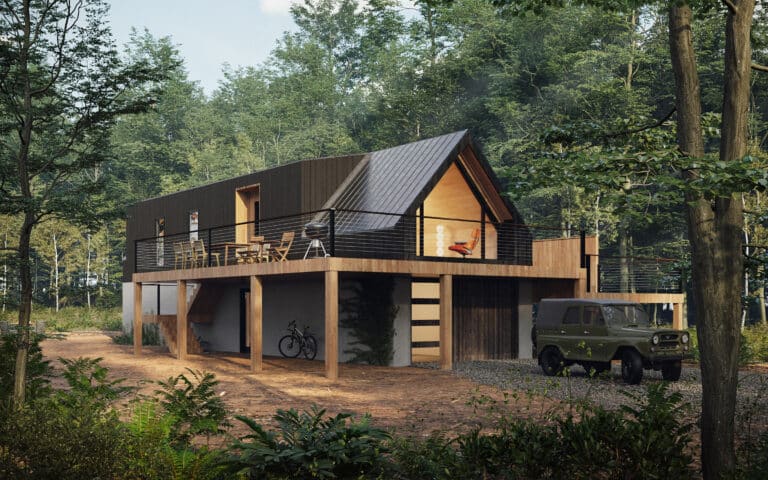
The A-Frame ADU
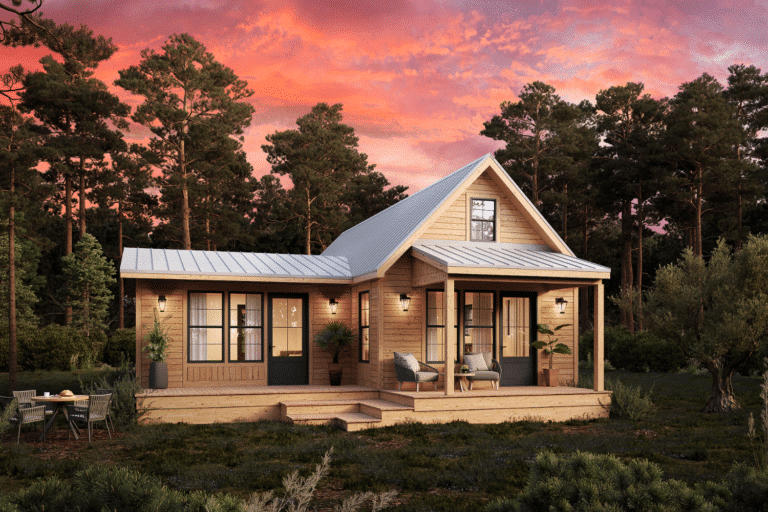
The Grove ADU
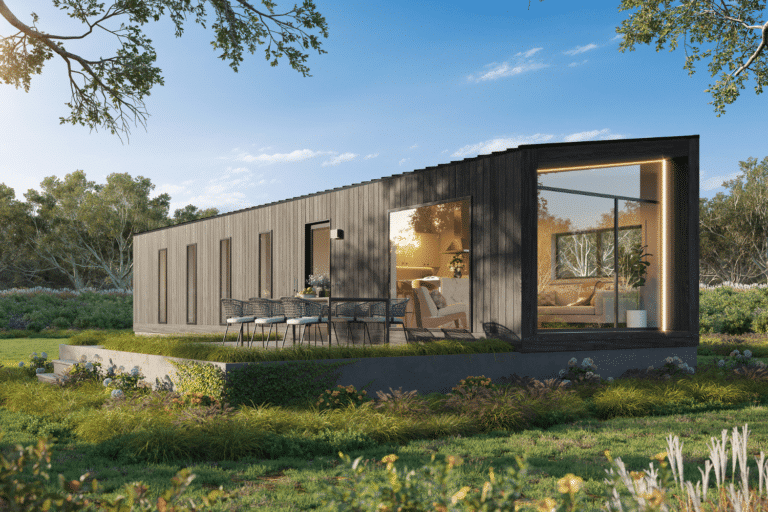
The Luna ADU
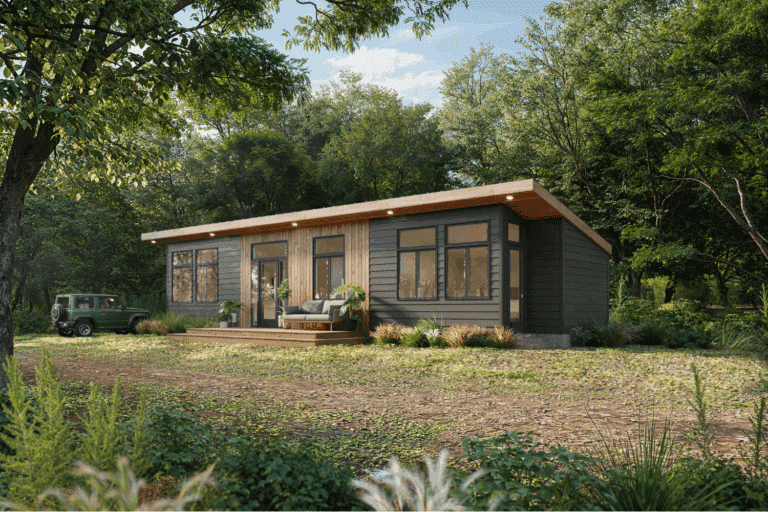
The Sonoma ADU
In many areas your ADU must be built to the local building code guidelines. At Zook Cabins all of the ADUs that we have to offer are built to your local standards. This allows you to have a fully usable space from the day that it is delivered
What Is Considered An ADU in Connecticut?
In Connecticut, an ADU is a fully independent living space, complete with its own kitchen, bathroom, and sleeping area, located on the same lot as a single-family home. It can be a basement apartment, a converted garage or attic, or a detached cottage. While the state provides a broad definition, local towns set specific rules on size, parking, and zoning, so it’s important to check with your local planning office before building. To help simplify the process, we created a guide, What Are ADUs?, for more details.
Most ADUs are built as standalone structures, but attaching one to your home may also be an option depending on your property. If you’re curious how to maximize your space, contact Zook Cabins, we’d love to walk you through your ADU possibilities.
What Is the Minimum Size for an Accessory Dwelling Unit?
In Connecticut, ADU construction must comply with specific standards, including a maximum size limit, whichever is smaller between 30% of the primary home’s floor area or 1,000 square feet, and the removal of any minimum size requirement. Additionally, although Connecticut no longer enforces a minimum size requirement, individual towns may still set their own through local zoning regulations.
Can Park Model Tiny Homes Be Used As ADUs?
Some areas will allow you to use a park model tiny home as an ADU. However, each state varies, and even more so, each local government has its own regulations on this.
To better understand your options, be sure to check out our article The Clear Cut Guide To ADUs And Tiny Homes. Additionally, you can read our article on tiny home regulations in Connecticut to see what is allowed in every state we serve.
Can Log Cabins Be Used As ADUs?
Yes, log cabins could be used as an ADU so long as they fit in with your sizing requirements from the local municipality.
Generally speaking, an ADU may not be larger than the primary dwelling on your property or may not exceed a specific size. With this in mind, many of our log cabins can accommodate the size specifications of an ADU.
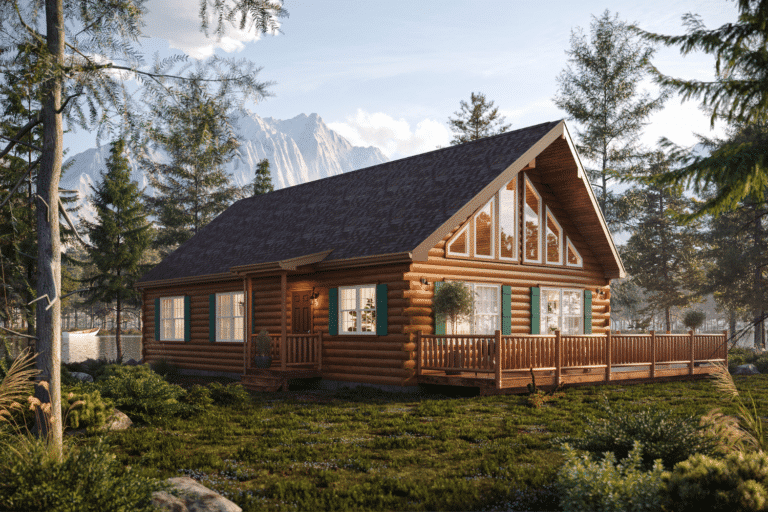
The Chalet
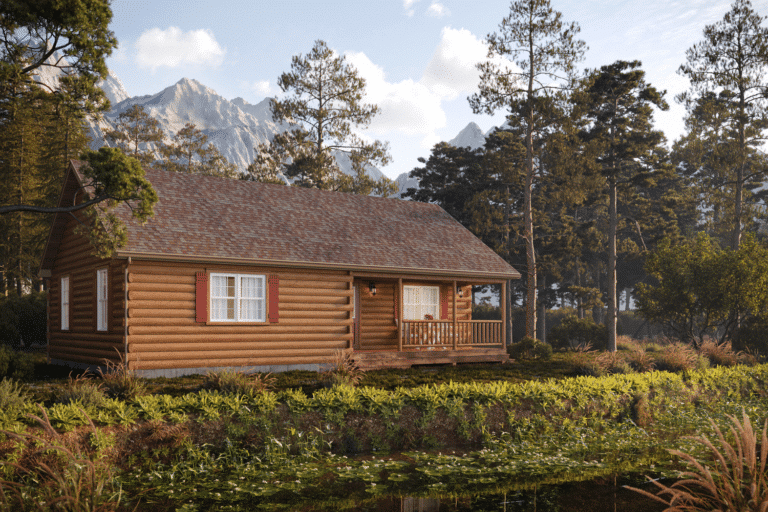
The Frontier
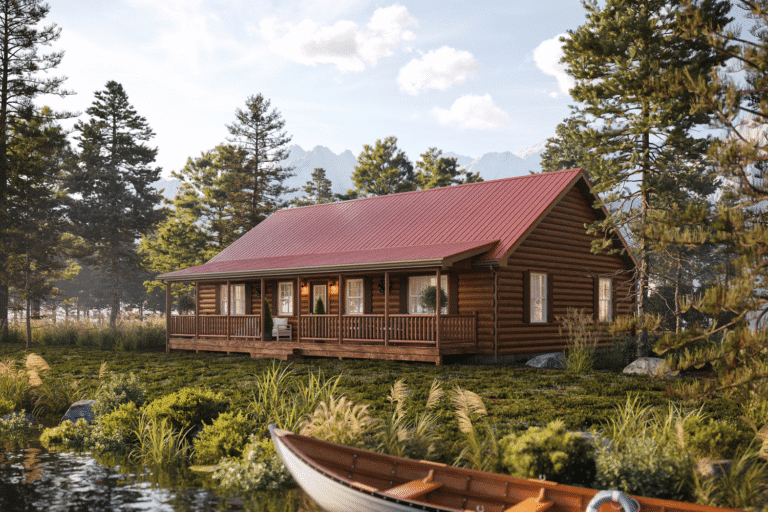
The Musketeer
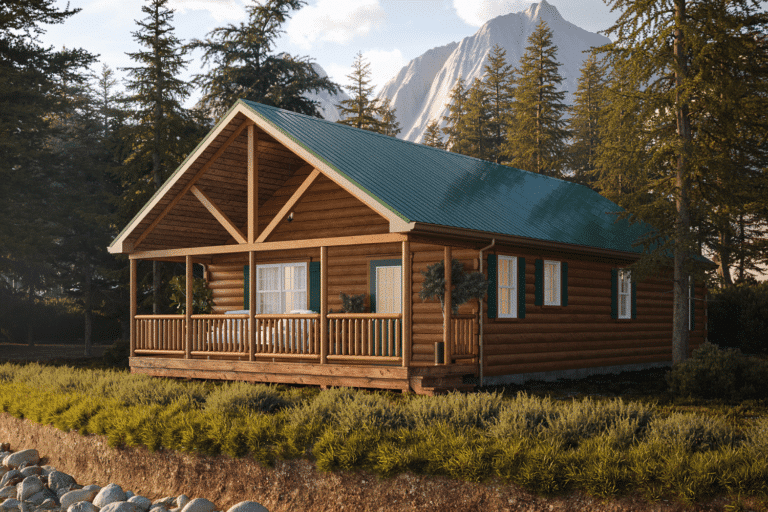
The Settler
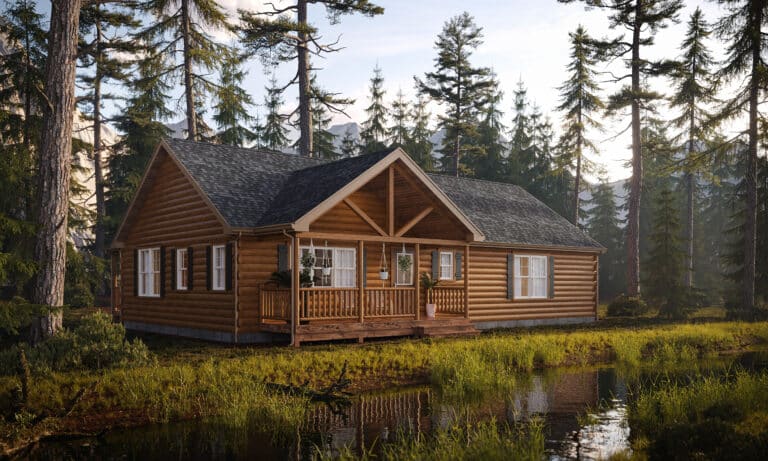
The Pioneer
Can Modern Cabins Be Used As ADUs?
Yes, modern cabins can function as ADUs, provided they meet your municipality’s size and zoning requirements.
Typically, this means the unit must be smaller than the main residence or within a certain square footage limit. Fortunately, many of our modern cabin models fall well within these guidelines, making them a viable option for your ADU plans.
Additionally our A-Frame cabin is already built in an A-Frame ADU model. This allows you to take some of the guess work out of the knowing if your cabin will be approved as an ADU.

The A-Frame Cottage

The A-Frame Modular Peak
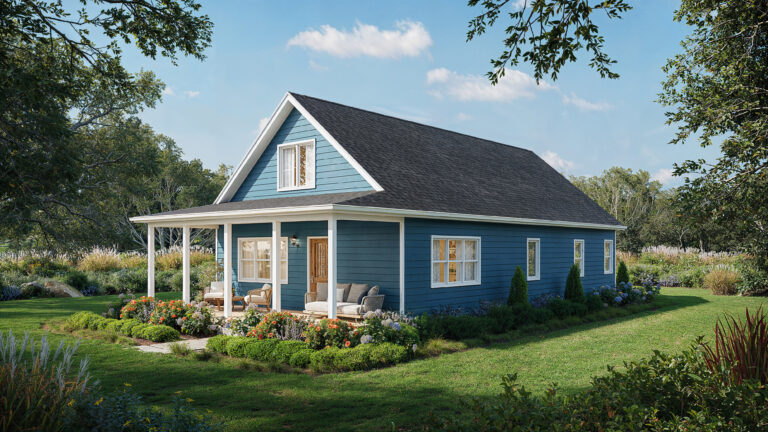
The Avon
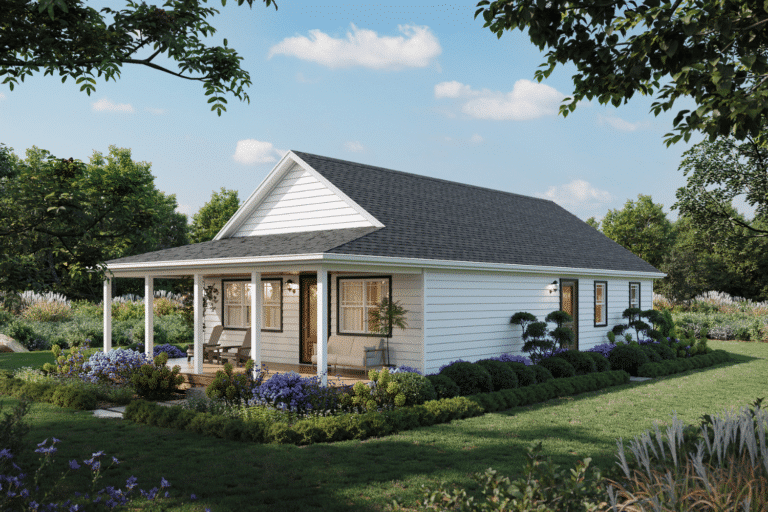
The Beck
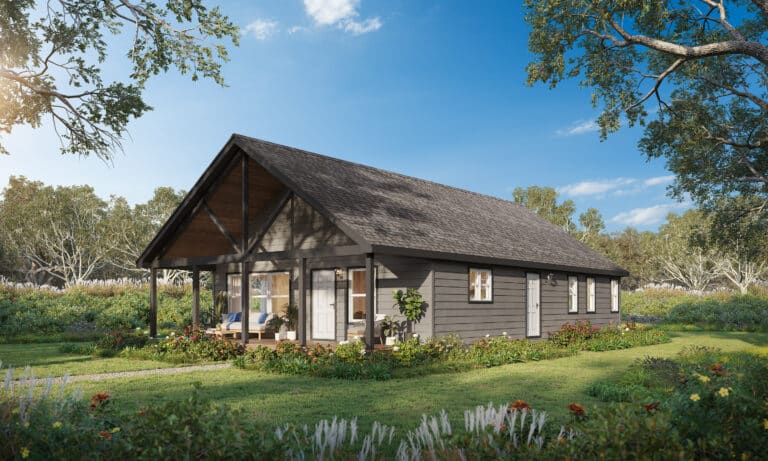
The Bourn
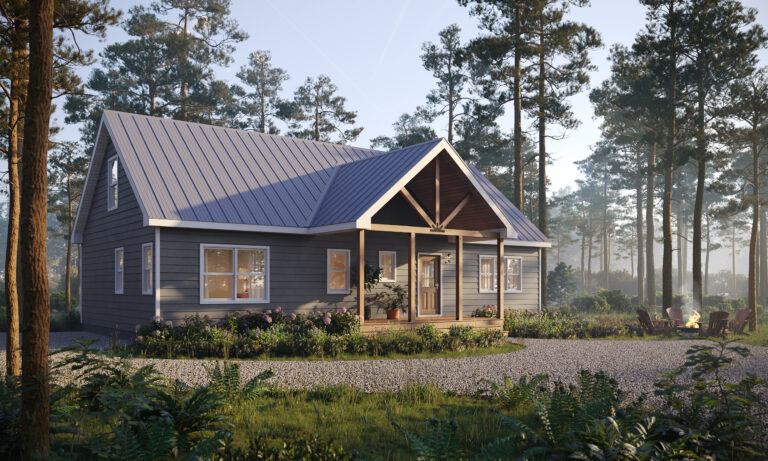
The Franklin
What Is the Difference Between a Prefab ADU and a Modular ADU?
The main difference between a prefab ADU and a modular ADU is how they are built and delivered.
Prefab ADU
A prefab ADU refers to any unit built completley off-site and transported to your property. Typically these are called shed homes (which is different than a tiny home on wheels). These homes are delivered and are comppletley finished and ready to use as soon as you recieve them.
Modular ADU
A modular ADU is a specific type of consturctuion that blends together prefinished moduels and finalized on site construction. The moduels are fully finished sections, that are built inside a factory. What makes this style of construction is different than a completley prefab ADU is that the finished modules are connected to each other on site.
Hence the term modualr construction.
One thing to keep in mind is that some of our ADUs, like the one bedroom room A-Frame ADU, are built completley off site. And they ready to move into upon install to your foundation.
However, what makes these modular units different than a prefab ADU is that they are built to meet or exceed your local building codes.
To sum it up, prefab and modular ADUs both offer a great solution to the ADU need. However, they are very different in their construction. Modular ADUs will be built off-site and have their final assembly on-site when they are attached to your foundation. On the other hand, prefab ADUs are built entirely off-site and are fully finished upon delivery. However, they will not be built to the same standards as a modular ADU.
For a more in-depth look into the difference between prefab ADUs and modular ADUs, read our article on the subject.
Do You Need A Permit For An ADU in Connecticut?
Yes, you need a permit to build or convert an ADU in Connecticut.
Although state law allows ADUs “as of right” in many areas, permits are still required to ensure the unit meets local building, zoning, and safety codes. Most towns require at least a zoning and building permit, and possibly additional permits for plumbing or electrical work.
Since rules vary by municipality, it’s important to contact your local planning or building department to understand the exact requirements.
Are There Any Incentives or Grants for ADUs in Connecticut?
While Connecticut doesn’t currently have a statewide grant program dedicated solely to ADUs, some municipalities may offer their own financial or zoning support.
Homeowners should check directly with local planning and zoning offices for available opportunities.
There may also be limited possibilities for funding through broader programs like HUD’s HOME Investment Partnerships Program or the USDA Rural Housing Service Grant, depending on location, income, and project specifics.
If you’re curious about where else ADUs are thriving, be sure to check out our guide to the Top 7 ADU-Friendly States. If you’re planning your own ADU project, it’s important to confirm funding eligibility and local zoning requirements. Always check with your town’s zoning department before you start.
Can My ADU Be Bigger Than My House?
No, in most areas, accessory dwelling units are not allowed to be larger than the principal structure on the property, including the main house. For more specific information on size limitations, please contact your local building department.
Can an ADU Have Multiple Bedrooms and Bathrooms?
Yes! ADUs in Connecticut can include more than one bedroom and bathroom, but keep in mind that local zoning rules may limit the size and number of rooms.
While ADUs are typically smaller than the main home, each town sets its own guidelines for how big they can be and how many people can live there.
What Features are Included in An ADU from Zook Cabins?
While each Zook cabin ADU model comes with its own unique style and layout, all units share a strong foundation of high-quality, dependable features. Every Zook ADU is a certified modular unit, built to meet or exceed all applicable state and local building codes.
Standard across all models are durable metal roofing, insulated windows, and finished flooring, as well as cabinets for storage and functionality. In addition, each unit comes fully equipped with wiring, plumbing, and insulation, making them ready for comfortable, year-round living.
Though specific features may vary by design, every Zook ADU is built with the same commitment to quality, compliance, and livability.
Customization:
With Zook Cabins, you have the power to design a home that truly fits your style. We offer four distinct ADU styles to choose from, so if one isn’t quite the right fit, you have plenty of other options. Each model has features that you can select to create a truly unique experience. Such customization include, cabinets, counter tops, and tilework.
Size and Features:
Our ADUs range in size from 571 to 848 square feet, offering a comfortable living space without sacrificing quality. Each unit comes equipped with essential features like light fixtures, shelves, faucets, and plumbing, all crafted with high-quality materials to ensure lasting comfort and durability.
Variety of Styles:
Our ADUs offer plenty of flexibility when it comes to style. Whether you’re drawn to the classic charm of a cabin like The Sonoma or prefer a more streamlined style like The Luna, we have options to match your vision. No matter your style, we’re here to help you create the perfect space!
Are Zook Cabins’ ADUs Built to Code?
Yes! All of Zook Cabin’s ADUs, are built to Connecticut building codes.
They are fully functional houses with a smaller footprint, offering all the essential features of a traditional home in a more compact form.
Despite their size, they still require a permanent foundation to ensure stability, safety, and compliance with local regulations. In most cases your
Are ADUs A Good Investment?
Absolutely! Accessory Dwelling Units ADUs can be a smart investment, offering both financial returns and long-term flexibility.
They often increase property value and can generate steady rental income, especially in areas with high housing demand. This income can help cover mortgage payments or fund other expenses, and homes with ADUs may appeal to buyers looking for rental potential or multigenerational living.
What Are the Requirements for ADUs in Each County in Connecticut?

Each county in Connecticut has their own specific ADU regulations.
We advise you reach out to your local building department to confirm current zoning rules, permitting requirements, and any design or size restrictions that may apply to your property before beginning your project.
Does Hartford County Allow ADUs?
Yes, ADUs are allowed in Hartford County, CT, but regulations are determined by each town or city individually.
Some towns fully allow ADUs under state guidelines, while others have set their own specific rules. Homeowners should check with the Hartford Planning and Zoning Department to understand the requirements in their area.
Does Fairfield County Allow ADUs?
Yes, ADUs are allowed in Fairfield County, CT, but regulations are set by each town or city, not by the county itself.
While Connecticut state law encourages ADUs, some towns in Fairfield County have opted out or created their own rules. Whether you can build an ADU, and the specific requirements, depends on the town you live in. Homeowners should check with the Fairfield Town Plan & Zoning Department for current regulations.
Does Litchfield County Allow ADUs?
Yes, ADUs are allowed in Litchfield County, CT, but regulations are determined by each individual town or city, not by the county.
Some towns follow the state’s ADU guidelines, while others have set their own rules or opted out. Homeowners should check with the Town of Litchfield Land Use Department to understand the specific ADU regulations in their area.
Does Middlesex County Allow ADUs?
Yes, ADUs are permitted in Middlesex County, CT, but decisions are made at the town level, not the county level.
Each town sets its own requirements regarding ADUs, and rules can vary widely. It’s important for homeowners to contact the The Middletown Building Department for the latest information.
Does New Haven County Allow ADUs?
Yes, ADUs are allowed in New Haven County, CT, but each city or town controls its own zoning regulations.
While many towns follow state guidelines, others have opted out or made modifications. Homeowners should confirm ADU rules directly with the New Haven Zoning and Regulations Department.
Does New London County Allow ADUs?
Yes, ADUs are allowed in New London County, CT, but local municipalities, not the county, set the rules.
Some towns allow ADUs with few restrictions, while others have specific conditions. Always check with the New London Planning, Zoning & Wetlands Division to learn what’s permitted in your area.
Does Tolland County Allow ADUs?
Yes, ADUs are permitted in Tolland County, CT, but regulations are established by each town individually.
Whether an ADU is allowed—and what the requirements are—depends on the local zoning code. Homeowners should verify the current ADU policies with the Tolland Planning and Zoning Commission.
Does Windham County Allow ADUs?
Yes, ADUs are allowed in Windham County, CT, but zoning rules are handled by each town, not the county.
Some towns encourage ADU development, while others may have more restrictions. It’s important to contact the Windham Planning and Zoning Commission to understand what is allowed.
Find Your Accessory Dwelling Units Requirements in Connecticut By Municipality
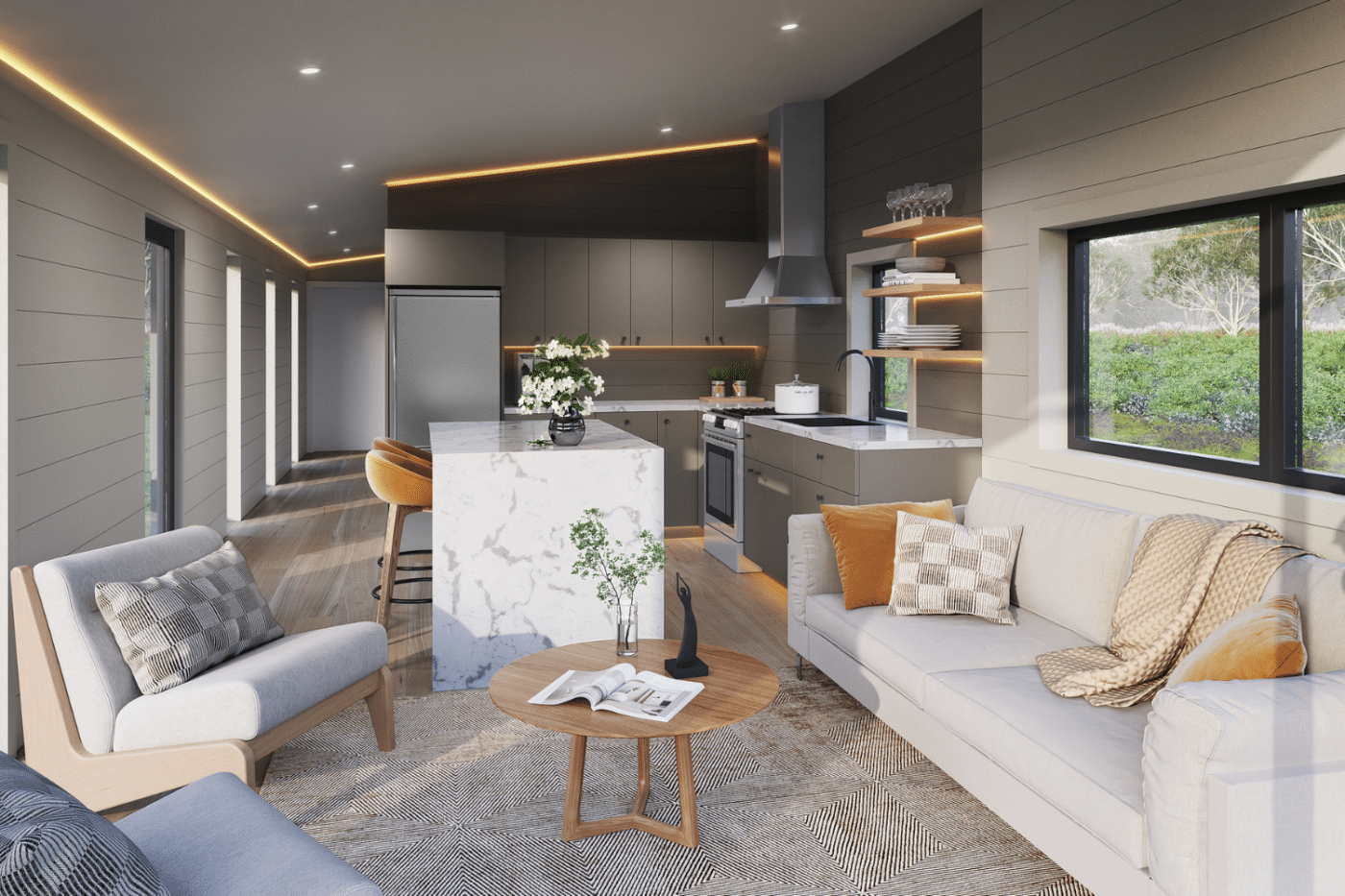
| County | Contact | Allows ADUs | Min Sq. FT. | Max Sq. FT. |
| Bridgeport | Bridgeport Zoning Department | Yes | Not Specified | 40% of main home’s floor area or 1,500 sq. ft. |
| Bristol | Bristol Department of Land Use | Yes | Not Specified | 750 sq. ft., no more than ⅓ or primary home’s living area |
| Danbury | City of Danbury Planning and Zoning | Yes (w/conditions) | Not Specified | Not Specified |
| East Hartford | East Hartford Zoning Department | Yes | Not Specified | 400 sq. ft, ceiling height of 6’8 |
| Fairfield | Fairfield Town Plan & Zoning Department | Yes | Not Specified | 40% of the primary home’s floor area or 1,500 sq. ft. |
| Greenwich | Greenwich Department of Land Use | Yes | Not Specified | 800 sq.feet. |
| Hamden | Hamden Planning and Zoning Department | Yes | 300 sq. ft. | 1,000 sq. ft. |
| Hartford | Hartford Planning and Zoning Division | Yes | 30% of main home floor area or 1000 sq. ft. | |
| Manchester | Manchester Planning and Zoning Commission | Yes | 350 sq. ft. | 1,000 sq. ft. or 30% of main home’s floor area |
| Meriden | Meriden Planning and Zoning Department | Yes | Not specified | Not Specified |
| Middletown | Middleton Department of Land Use | Yes | Not Specified | 800 sq. ft. |
| Milford | Milford Planning and Zoning Office | Yes | Not Specified | Not Specified |
| New Britain | City of New Britain Zoning and Planning Department | Yes | Not Specified | 800 sq. ft. or 40% of main home’s floor area |
| New Haven | City of New Haven Zoning and Regulations Department | Yes | Not Specified | Not Specified |
| Norwalk | Norwalk Zoning Regulations | Yes | Not Specified | 700 sq. ft. |
| Stamford | Stamford Zoning Board | Yes (w/conditions) | Not Specified | 800 sq. ft. |
| Stratford | Office of Planning & Zoning | 400 sq. ft. | 800 sq. ft. | |
| Waterbury | City Planning, Zoning & Inland Wetlands Department | Yes | Not Specified | 1,000 sq. ft. or 30% of main home’s floor area |
| West Hartford | West Hartford Zoning and Planning Department | Yes | Not Specified | 1,000 sq. ft. or 30% of main home’s floor area |
| West Haven | West Haven Planning and Zoning Commission | Yes | Not Specified | 550 sq. ft. |
Does Bridgeport, CT, Allow ADUs?
Yes, Bridgeport, CT allows ADUs!
You can build attached or internal ADUs in Zones AAA, AA, R-3, R-2, A, B, and C. Detached ADUs are allowed on lots with at least two acres. Your ADU must be no larger than 40% of the main home’s floor area or 1,500 sq. ft., whichever is smaller, and must include one off-street parking space.
The owner must live in either the main home or the ADU. A permit, architectural plans, and full code compliance are required. Some areas may have extra rules, so check with the Bridgeport Zoning Department before starting!
Does Bristol, CT, Allow ADUs?
Yes, Bristol, CT allows the habitation of ADUs!
The city follows the International Residential Code (IRC) through the Connecticut State Building Code. As long as you follow the regulations, you’re free to occupy an ADU in Bristol, CT.
Your ADU must be located within or attached to a single-family home on an existing lot of record, and either the main home or the ADU must be owner-occupied. The ADU must be between 750 square feet and no more than one-third of the primary home’s living area, with a maximum of two bedrooms. It must meet all zoning requirements for single-family dwellings, including setbacks, height limits, and lot coverage, and provide one off-street parking space per bedroom. An interior door must also connect the main home and the ADU.
Additionally, you’ll need building permits and must pass all required inspections. Since local requirements can vary, we recommend checking with the Bristol Department of Land Use to make sure you have the latest information for your property.
Does Danbury, CT, Allow ADUs?
ADUs are permitted in designated residential areas in Danbury, as long as certain conditions are met. The ADU must be either attached to the main residence or located on the same lot. There are also size limitations and parking requirements that you’ll need to follow.
Because local regulations can change, it’s very important to check with the City of Danbury Planning and Zoning for the most up-to-date information and to make sure your project fully complies with all current rules before you get started!
Does East Hartford, CT, Allow ADUs?
ADUs are allowed in East Hartford, CT. By obeying the International Residential Code (IRC), which applies to Connecticut in its entirety, you’ll be able to live in an ADU in East Hartford!
In order to conform to the IRC, your ADU will need to meet the size requirement of 400 square feet or smaller and a ceiling height of 6’8.” Before construction takes place, you need to have a building permit. You will also need to pass inspections once the project is complete.
Some areas in East Hartford may or may not have harsher regulations. To learn more about a specific area in your town, check with the East Hartford Zoning Department.
Does Fairfield, CT, Allow ADUs?
Yes! Fairfield permits ADUs in specific residential zones, including AAA, AA, R-3, R-2, A, B, and C for attached units. Detached (free-standing) ADUs are allowed in Zones AAA, AA, and R-3, provided the lot meets setback and other design requirements.
The ADU must be no larger than 40% of the primary home’s floor area or 1,500 square feet, whichever is smaller. It must have its own kitchen, bathroom, and entrance, and at least one off-street parking space must be provided. The homeowner must live in either the primary residence or the ADU.
If you are building an ADU in Fairfield, you must first apply for a written permit and provide plans showing the proposed changes. The ADU must meet all applicable housing, building, fire, and health code requirements.
Local regulations can change, so we highly recommend contacting the Fairfield Town Plan & Zoning Department before starting your project to ensure you have the most accurate and updated information!
Does Greenwich, CT, Allow ADUs?
Yes! The Town of Greenwich, CT allows ADUs!
The rules declare that external ADUs must be a maximum of 800 square feet in size, but may be allowed up to 1,000 square feet with Planning & Zoning Commission approval. Only one ADU is allowed per single-family property, and it must remain clearly secondary to the main home, with no second front door visible from the street. Either the main home or the ADU must be owner-occupied, and at least one off-street parking space must be provided for the ADU.
Detached ADUs must meet setback requirements, and garage conversions are permitted if the lost parking is replaced elsewhere on the property. New driveways for ADUs are not allowed, and all ADUs must comply with state and local building, health, and zoning codes.
Before building, it’s important to consult with the Greenwich Department of Land Use to ensure your project meets all requirements.
Does Hamden, CT, Allow ADUs?
Yes, Hamden, CT allows ADUs.
The town follows the International Residential Code (IRC). As long as you follow the regulations, you can have an ADU in Hamden, CT.
Your ADU must measure at least 300 square feet with a maximum floor area of not less than 30% of the principal dwelling unit or 1,000 square feet, whichever is less, and a maximum of 2 bedrooms. The homeowner must live in either the primary residence or the ADU. You’ll also need to acquire building permits from the town and pass all necessary inspections.We always recommend that you check with the Hamden Planning and Zoning Department to learn about the zoning laws in your area.
Does Hartford, CT, Allow ADUs?
Hartford, CT, does allow ADUs!
You can build one internal, attached, or detached ADU per lot in most areas where single-family homes are permitted. The ADU must be no larger than 30% of the main home’s floor area or 1,000 square feet, whichever is less. Either the main house or the ADU must be owner-occupied.
You’ll also need to provide off-street parking, ensure the design fits the look of the main house, and limit occupancy to two people. Utility connections can be shared or separate, and short-term rentals are regulated.
Requirements can vary depending on your location, so we highly recommend you contact the Hartford Planning and Zoning Division for the most accurate and up-to-date information.
Does Manchester, CT, Allow ADUs?
Yes. Manchester allows ADUs that are attached, inside, or detached as long as they meet the 350–1,000 sq ft size range and stay under 30% of the main home’s floor area.
Your ADU must be located on the same lot as the primary residence, and either the main home or the ADU must be owner-occupied.
The ADU must meet all zoning requirements for single-family dwellings, including setbacks, height limits, and lot coverage. You’ll need to provide at least one off-street parking space for the ADU, but curb cuts on the new driveway are not allowed. The ADU’s exterior access should be located at the side or rear of the dwelling to maintain the residential look from the street.
Additionally, some areas may have more strict rules, so we always recommend checking with the Manchester Planning and Zoning Commission for the most accurate information about your property.
Does Meriden, CT, Allow ADUs?
Yes, Meriden, CT allows the habitation of ADUs!
The city follows the International Residential Code (IRC) through the Connecticut State Building Code. As long as you follow the regulations, you can occupy an ADU in Meriden, CT.
Your ADU must be located on a lot with only one principal building and meet all lot size and bulk requirements. The unit must maintain the home’s original residential character, and exterior changes require approval from the Design Review Board.
Front yard parking is not allowed, and major structural changes are limited. You’ll also need building permits and must pass all required inspections. Additionally, some areas may have stricter rules, so we always recommend checking with the Meriden Planning and Zoning Department for the most accurate information about your property.
Does Middletown, CT, Allow ADUs?
Yes, Middletown, CT allows the habitation of ADUs!
The city follows the International Residential Code (IRC) through the Connecticut State Building Code. As long as you follow the regulations, you’re free to occupy an ADU in Middletown, CT.
Your ADU must be attached to a single-family home and connected through an interior doorway. It must not exceed 800 square feet and must share the same street address, utilities, and driveway as the main residence.
The homeowner must live in either the primary home or the ADU. You’ll also need to obtain building permits and pass all required inspections. Some areas may have stricter rules, so we always recommend checking with the Middleton Department of Land Use for the most accurate information about your property.
Does Milford, CT, Allow ADUs?
Yes, ADUs are permitted in Milford, CT.
The city is accommodating toward ADUs due to being compliant with the International Residential Code (IRC) which has rules regarding ADUs.
To meet IRC requirements, your ADU must be, at most, 400 square feet and have at least 6 feet and 8 inches of space between the floor and ceiling. You must obtain a building permit from the city and pass the inspections once your house is completed.Contact the Milford Planning and Zoning Office to find out if your area has any ADU-related restrictions, as some areas may have stricter laws than others.
Does New Britain, CT, Allow ADUs?
New Britain, CT, does allow ADUs!
However, they are subject to specific regulations. ADUs are only permitted on single-family lots and must be attached to the primary residence, detached ADUs are not allowed.
To build an ADU, the lot must be larger than 8,000 square feet. The ADU itself cannot exceed 800 square feet or 40% of the main home’s floor area, whichever is smaller, and it can have no more than one bedroom.
An ADU requires one off-street parking space, and the owner must reside on the property. It must match the main house in style and materials. Since regulations can change, we recommend you visit the City of New Britain Zoning and Planning Department for the most up-to-date information before moving forward with your project.
Does New Haven, CT, Allow ADUs?
Yes, you can build an ADU in New Haven, CT!
To qualify, your property must be located in an approved zoning district; specifically RM-1, RM-2, RS-1, or RS-2, and the lot must be at least 4,000 square feet. You must also be the homeowner and live on the property.
New Haven has specific zoning rules for ADUs, so it’s a good idea to check with the City of New Haven Zoning and Regulations Department to make sure your project meets all the requirements before getting started!
Does Norwalk, CT, Allow ADUs?
Norwalk, CT, does indeed allow ADUs.
Under local zoning regulations, ADUs are permitted on properties with single-family homes, whether attached to or detached from the main house. Detached ADUs can be up to 700 square feet, while attached ADUs can be up to 1,000 square feet. Property owners must live on the premises, provide at least three off-street parking spaces, and ensure the ADU matches the architectural style of the main home.
Detached units also require specific setbacks and landscaping buffers. Building permits and either zoning approval or site plan review are necessary, depending on whether the ADU is attached or detached. Since some neighborhoods may have additional requirements, it’s best to contact the Norwalk Zoning Regulations Department to make sure you have the latest information before starting your project.
Does Stamford, CT, Allow ADUs?
Yes, Stamford, CT allows ADUs, but with certain conditions!
In 2022, Stamford adopted its own ADU rules, opting out of the broader state regulations. You can build an ADU on a single-family lot that’s at least 10,000 square feet. The unit can be up to 800 square feet in size and house up to three people.
The property owner must live in either the main home or the ADU, and you’ll need to provide at least one off-street parking space. Short-term rentals like Airbnb are not allowed. Since Stamford’s rules are more specific than the state’s, we recommend contacting the Stamford Zoning Board to make sure you have the latest information before you start!
Does Stratford, CT, Allow ADUs?
Yes, Stratford, CT allows the habitation of ADUs!
The city follows the International Residential Code (IRC) through the Connecticut State Building Code. Stratford requires the occupants to be family members. The accessory unit must connect to the other unit via an interior doorway. It must be at least 400 square feet and cannot exceed 800 square feet or 25% of the total livable area of the overall residence, whichever is smaller. Since regulations may change with time, we suggest contacting the Stratford Office of Planning & Zoning for the latest information before starting your project.
Does Waterbury, CT, Allow ADUs?
Yes, Waterbury, CT, allows accessory dwelling units ADUs.
Waterbury adheres to the state’s default ADU regulations. Under these regulations, homeowners in Waterbury can add one ADU per lot, whether attached, detached, or internal to the primary residence. The unit must be no larger than 1,000 square feet or 30% of the main dwelling’s floor area, whichever is less. Importantly, towns cannot impose requirements such as age restrictions for occupants, mandates that tenants be related to the homeowner, or parking requirements exceeding one space per unit.
If you’re considering building an ADU in Waterbury, you should consult the City Planning, Zoning & Inland Wetlands Department for the most current permitting procedures and any local guidelines.
Does West Hartford, CT, Allow ADUs?
Yes, West Hartford, CT, does allow ADUs!
In single-family residential areas, one ADU is allowed per lot as long as it stays secondary to the main home.The ADU must have its own kitchen, bathroom, and sleeping facilities. It can be either attached or located in a detached accessory building. The maximum size of the ADU is limited to 1,000 square feet or 30% of the principal dwelling’s gross floor area, whichever is smaller.
Owner occupancy is required in either the main home or the ADU, and at least one off-street parking space must be provided for the ADU without reducing the parking available for the main house. Detached ADUs must meet specific side and rear setback requirements, and ADUs must maintain the one-family residential character through careful design, materials, and orientation. Regular affidavits confirming owner occupancy are also required if the unit is rented. As always, it’s best to check with the West Hartford Zoning and Planning Department for the latest regulations before starting your project.
Does West Haven, CT, Allow ADUs?
Yes, West Haven, CT allows the habitation of ADUs.
While the city has opted out of Connecticut’s Public Act 21-29, which standardizes ADU regulations statewide, West Haven permits ADUs under its own zoning regulations. These regulations may differ from the state law in aspects such as unit size, location, and parking requirements. Therefore, it’s essential to consult the city’s zoning code or contact the Planning and Zoning Department for specific guidelines applicable to your property.
Your ADU must have a size limit of 550 square feet. It’s important that you have a proper building permit and meet the requirements to pass all the inspections.Keep in mind that zoning rules can vary within the city, so it’s best to contact the West Haven Planning and Zoning Commission before moving forward with your project.
Searching For A Prefab ADU Builder Serving Connecticut?

If you’re thinking about adding an ADU to your property in Connecticut, understanding local regulations and choosing the right builder are key steps toward making your project a success. With Connecticut’s growing support for ADUs and the flexibility they offer, now is a great time to invest in a high-quality, fully compliant unit. At Zook Cabins, we specialize in building certified modular ADUs that meet all state and local building codes, offering a range of stylish, durable models to fit your needs. Whether you’re looking for extra living space, rental income, or a cozy place for family, we’re here to help make your vision a reality.
Ready to start your ADU journey? Learn more about Zook’s ADU options for Connecticut homeowners today!
Tiny Home & ADU Rules By State: See How They Compare?
Each state has completely different qualifications for tiny living and ADUs. We understand how overwhelming it can be to find all of that information. To make your research easier, we’ve gathered key information on tiny living and ADU qualifications for every state we serve.
